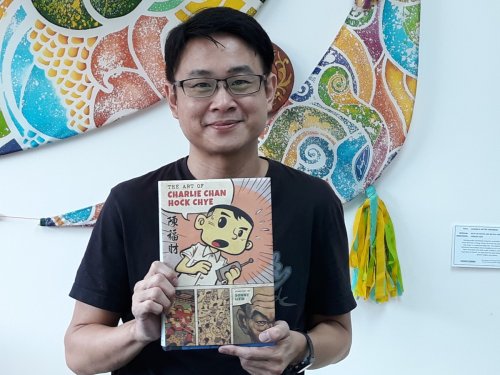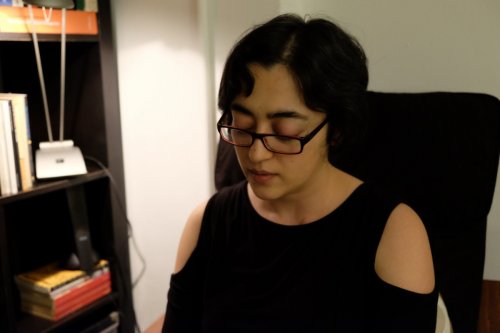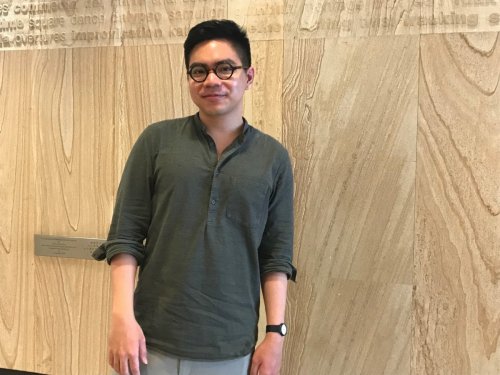By Lim Jun Rong Terence
Diploma in Creative Writing for TV and New Media
Singapore Polytechnic

Sonny Liew didn’t expect The Art of Charlie Chan Hock Chye to be so well received internationally. (Photo credit: Terence Lim)
Like many of us have done at some point in our childhood, Sonny Liew, too, loved to copy drawings of cartoons and characters when he was young. “The only difference,” he says, “is that I never stopped drawing.”
And it’s a good thing that he didn’t. Sonny is now the recipient of three prestigious Eisner Awards – the equivalent of the Oscars for the comic industry – for Best Writer/Artist, Best Publication Design, and Best US Edition of International Material (Asia). These recognitions are for The Art of Charlie Chan Hock Chye, which was also the first ever graphic novel to win the Singapore Literature Prize in 2016. The story of a fictional cartoonist in Singapore from the 1950s to the present day was also on the bestsellers lists at Amazon and The New York Times.
“I didn’t even think it would sell anywhere outside of Singapore,” the 43-year-old says with a sheepish smile. “I really didn’t know whether anybody else would be interested in it.”
The success is bittersweet though. The comic became a subject of controversy when the National Arts Council (NAC) withdrew its grant in 2015, citing politically sensitive content in the book. Sonny’s relationship with the NAC is still shaky after three years.
“They still maintain they will support me as an artist but they won’t support the book itself, which is a strange kind of division,” Sonny says. “I don’t know how it’s going to work out.”
One among a Handful
The boyish-looking comic artist’s first step into the industry was when he worked on a daily strip named Frankie and Poo for The New Paper. He then studied illustration at the Rhode Island School of Design in 2001.
Shortly after graduating, Sonny was signed to work on My Faith in Frankie for DC Vertigo, which also published The Sandman.
“I’ve been a big fan of Sandman,” Sonny said, “so the chance to do a story for the same imprint, sort of in the same universe was very exciting for me.”
Sonny mainly worked as a hired illustrator for publishers in the US and has published a few short comics of his own.
He is now one of the few full-time comic artists in Singapore.
He says comics are generally treated as something childish by default in Singapore, but feels that can actually be an advantage.
“You can do very serious things but people don’t approach it with this kind of trepidation,” he explains. “That gives me the opportunity to get under the radar a little bit.”
The Next Chapter
It’s a busy period for Sonny. He has been working on the Eternity Girl series for DC Comics. Local media recently reported he will also be contributing to the comic version of Adventure Time, the well-known animated television series from the US. Sonny is also currently doing research for his next comic.
Researching and writing for The Art of Charlie Chan was his chance to learn Singapore history—something he knew little about. Similarly, his next comic, he reveals, will be his curious venture into economics and capitalism.
The challenge? Making the book as engaging, but distinct from The Art of Charlie Chan Hock Chye.
“What I would like to do is to be able to make something…as interesting and yet not repeat the same things I did in this book,” Sonny says. “I’m not sure how it can be done, but I hope I can.”
By Quan Hui Lin, Joey
Diploma in Creative Writing for Television and New Media
Singapore Polytechnic

Being ‘S Raoul’ gave Shubigi Rao access to the art world she would not have had as a woman. (Photo Credit: Joey Quan)
The witty and charming Shubigi Rao is a fan of 10-year projects, such as Pulp – a film, book and visual art project about the history of book destruction and censorship, as well as her alter-ego: S. Raoul, the genius male scientist who allowed her freedom in a world where women are still seen as inferior.
How she became S. Raoul
The first time Shubigi put on the paper moustache that would go on to be S. Raoul’s defining facial feature, she was a student in India playing around with her classmates for a presentation. The moment she put on that moustache, she felt free.
“I just realised I didn’t feel female anymore, I didn’t feel looked at, I didn’t feel judged for being a female and having to perform as female all the time,” she said.
The liberation and honesty that came with S. Raoul made her love being him. He was her guide to getting objective feedback on her work, but it also shed some light on the sexism in the art industry.
Woman with a grand experiment
In 2003, Shubigi gave up her spotlight to her male alter-ego. For the next ten years, she refused to do solo shows, even though she had been “garnering some attention” while graduating with her Bachelor in Fine Arts at LaSalle.
“The idea was I didn’t want that visibility,” she said.
So, she gave all of that to her creation – a historian, scientist and mustached recluse. In return, she was able to access archives and build institutions as a protégé of S. Raoul, a man who didn’t even exist. She could do whatever she wanted, but this freedom came at a price. Now, after killing him off in a “tragic accident” in which he trips over an art installation, and even as a fairly well-respected artist and writer, she says she is unable to access the same things she once could.
Shubigi, who’s been based in Singapore for more than 10 years, was accused of plagiarising S Raoul thrice. When she revealed that his writings were actually hers, she was even told to her face, “that’s impossible, no woman could write this way”. And this is exactly what she wanted to address with this project – the fact that women are judged based on their gender, and not their work. The same critic who praised S. Raoul’s work dismissed hers, even though they were of the same quality.
Looking back
Now, five years later, Shubigi has embarked on another remarkable decade-long project – Pulp – travelling the globe and collecting anecdotes. Vol I of the project was shortlisted for the 2018 Singapore Literature Prize.
But it has not been easy working without S. Raoul. She has to “constantly justify her right to be in a field”.
And she’s tired of that.
“I could be completely liberated in a way, I could be completely outrageous,” she said of her alter-ego.
Wistfully, Shubigi says that she misses S. Raoul – her convenient scapegoat.
By Celine Tan Shi Tong
Diploma in Creative Writing for TV and New Media
Singapore Polytechnic

A Field Guide to Supermarkets in Singapore by Samuel Lee is his debut collection and won the prestigious Singapore Literature Prize 2018 – English Poetry. (Photo credit: Celine Tan)
It’s been a dream debut for writer Samuel Lee. His 2016 collection, A Field Guide to Supermarkets in Singapore, has clinched the Singapore Literature Prize for English Poetry.
“I am honoured and glad to have been selected from a shortlist of other excellent collections, and I am now anxious and excited about facing the task of asking more critical questions about my writing practice and grappling with the many urgencies of contemporary life,” the 26-year-old says in response to his win.
It's not just about supermarkets
The unusual title of his collection is a nod to the ‘field guide books’ for primary school students that were sold in the Singapore Science Centre back in the day. Samuel also loved the idea that these books sparked interest in everyday activities in Singapore.
For his own collection, Samuel chose supermarkets as they are a vital part of consumer culture. It’s a kind of hyper realism, he says, when the daily necessities we buy start to say something about the person we are. The poems are also inspired by his experiences of living in the US, and he compares the state of consumerism there and in Singapore.
Samuel describes his writing more of a curiosity than a passion. He says his poems come from his responses to visual art and the sights around him and describing them. The good news is that one can expect more such ‘curiosity’ from the talented writer. Samuel says winning the Singapore Literature Prize is just the first step. As he puts it, the award is less of an achievement than a direct challenge to keep on writing.


